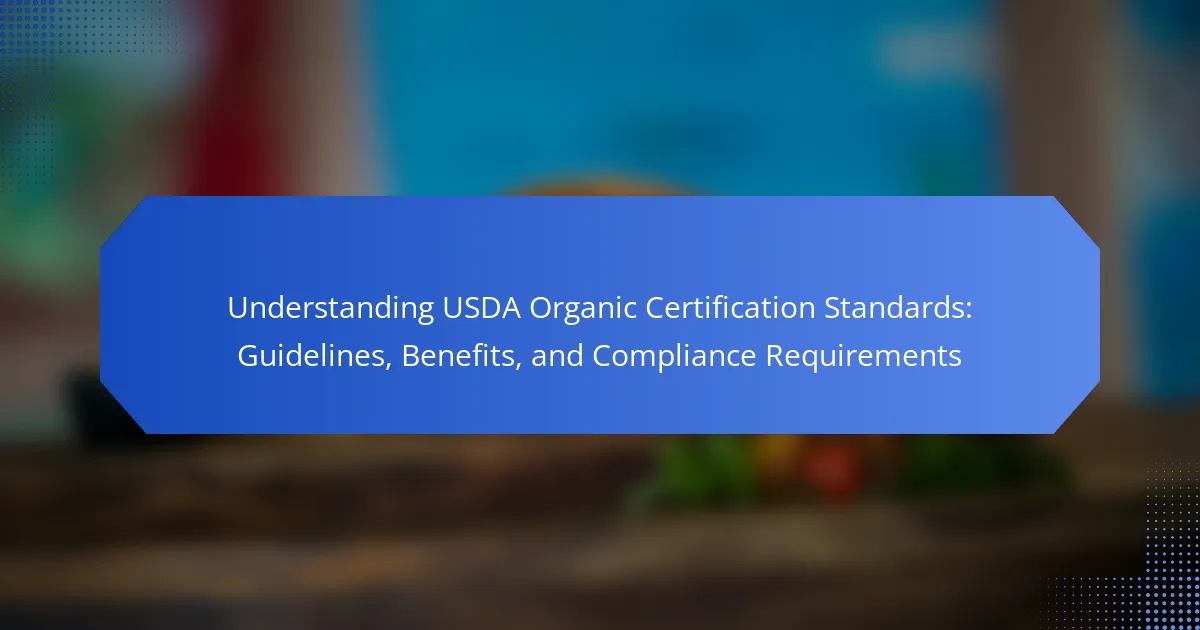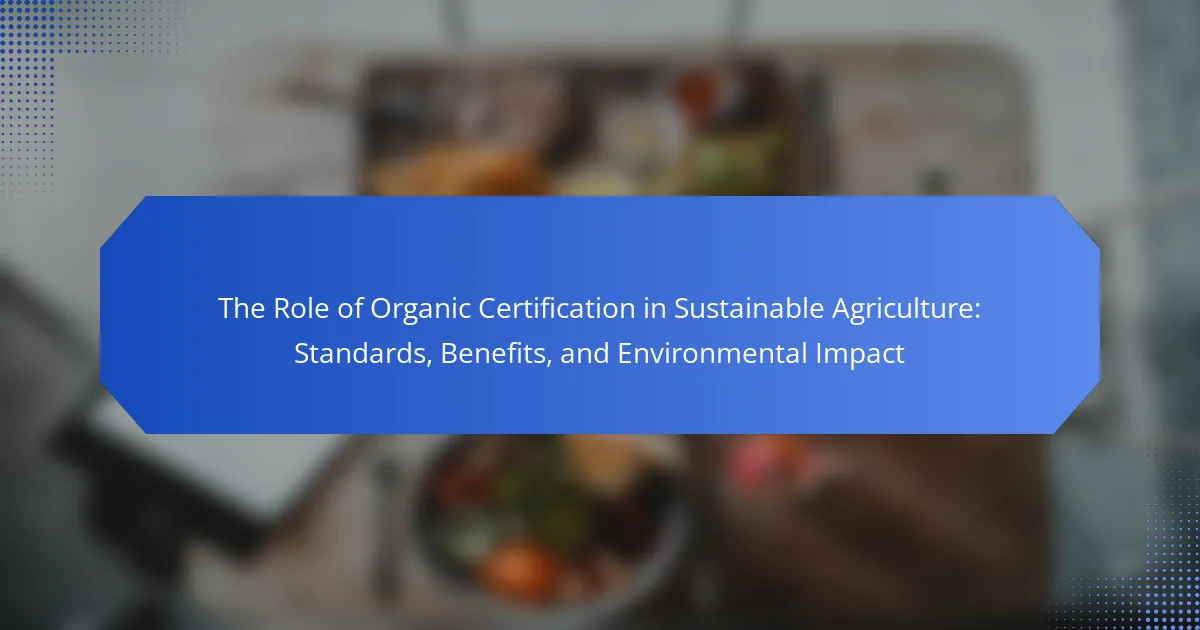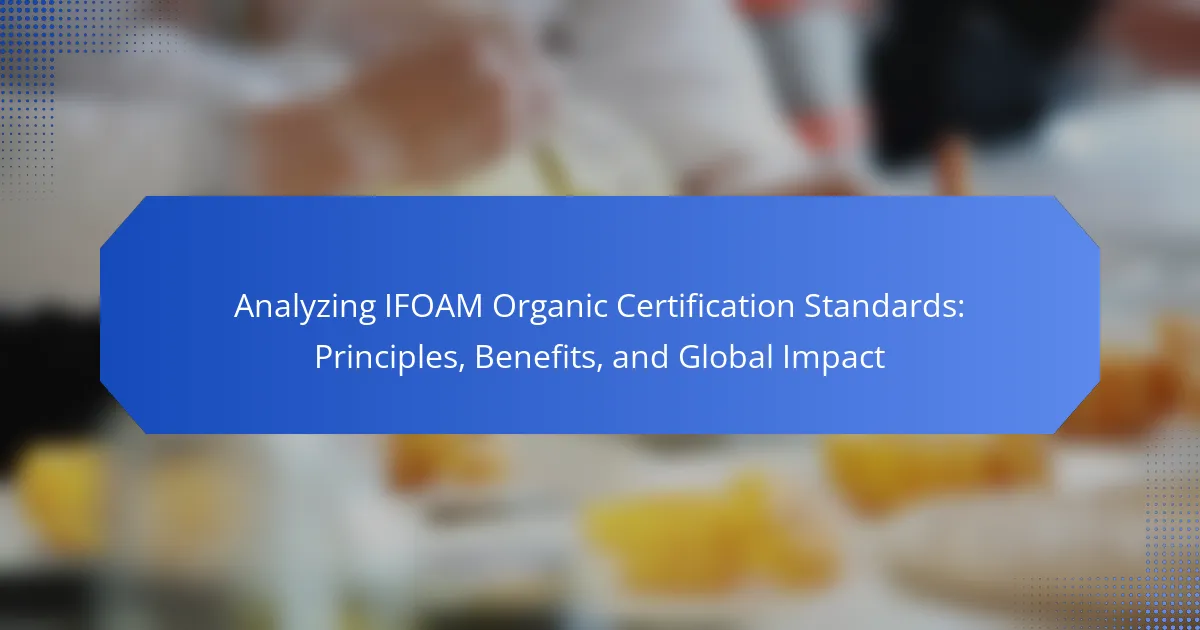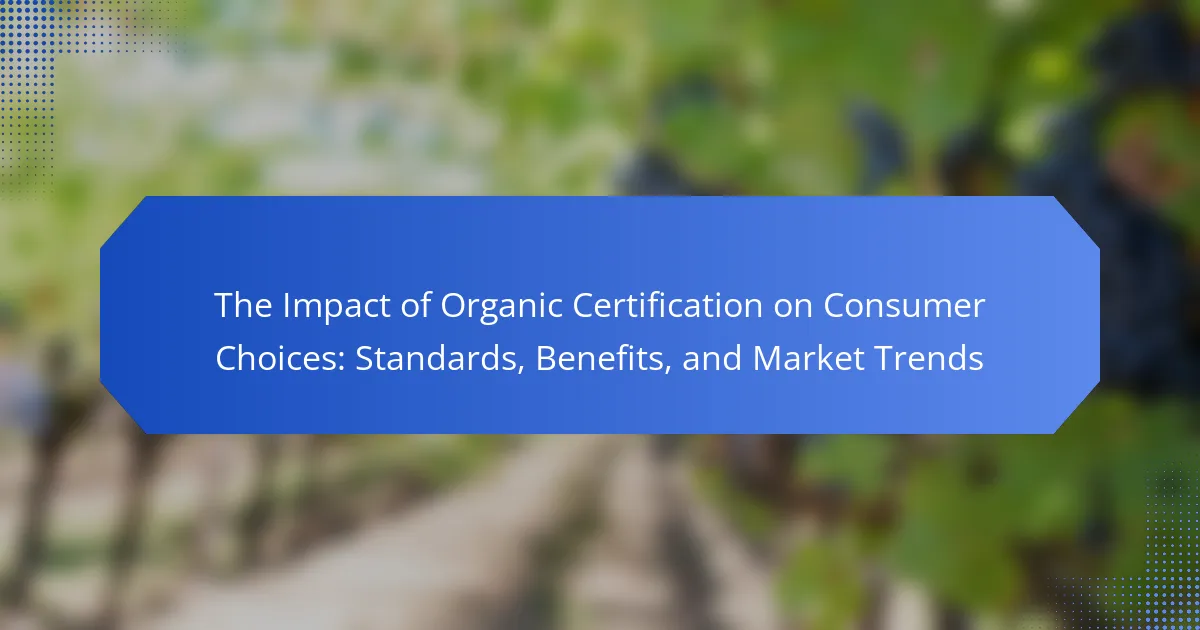Organic certification standards are essential guidelines that enhance food quality by promoting strict agricultural practices. These standards prohibit the use of synthetic pesticides and fertilizers, leading to healthier soil and crops, and result in higher nutrient levels and increased antioxidants in organic produce. Consumer trust in organic products is significantly influenced by the perception of safety and environmental benefits associated with organic certification. However, challenges such as certification costs, complexity of standards, limited market access, and risks of contamination can hinder producers from obtaining and maintaining organic certification. This article explores the impact of organic certification on food quality, its benefits, and the awareness among consumers regarding these standards.

How do organic certification standards impact food quality?
Organic certification standards enhance food quality by ensuring strict agricultural practices. These standards prohibit synthetic pesticides and fertilizers, promoting healthier soil and crops. They require the use of organic seeds and sustainable farming techniques. This leads to higher nutrient levels in food products. Research indicates that organic produce often contains more antioxidants compared to conventionally grown counterparts. Additionally, organic standards mandate rigorous testing for contaminants, ensuring safer food for consumers. Overall, these practices contribute to improved food quality and consumer trust in organic products.
What are the key organic certification standards?
Key organic certification standards include the USDA Organic, EU Organic, and JAS (Japanese Agricultural Standards). The USDA Organic standard requires that products contain at least 95% organic ingredients. The EU Organic standard mandates similar requirements, ensuring that farming practices promote biodiversity and ecological balance. JAS focuses on organic production methods and labeling in Japan, emphasizing environmental sustainability. These standards are critical for ensuring the integrity and quality of organic products. They help consumers identify products that meet strict organic farming criteria.
How do these standards vary across different regions?
Organic certification standards vary significantly across different regions. In the United States, the USDA sets specific guidelines for organic labeling. These include requirements for soil management, pest control, and prohibited substances. In the European Union, the standards are regulated by EU regulations, which emphasize biodiversity and sustainability. The EU also has stricter rules on the use of additives and processing methods. In Canada, the Canadian Organic Standards govern organic production, focusing on environmental stewardship. Each region adapts its standards based on local agricultural practices and consumer preferences. For instance, some countries may allow certain substances that others prohibit. This variability affects the perception and trust of organic products among consumers. Understanding these differences is crucial for consumers seeking authentic organic options.
What criteria are used to achieve organic certification?
Organic certification requires adherence to specific agricultural practices. These practices include the prohibition of synthetic pesticides and fertilizers. Organic farming must use natural substances and physical, mechanical, or biologically based farming methods. Crop rotation is essential to maintain soil health and fertility. Organic livestock must be raised without antibiotics or growth hormones. Animals must have access to the outdoors and be fed organic feed. Certification also mandates that organic products are processed without artificial preservatives or colors. Compliance with these criteria is verified through inspections and documentation.
Why is food quality important in organic certification?
Food quality is crucial in organic certification because it ensures that products meet specific standards for health and safety. Organic certification involves rigorous guidelines that dictate how food is grown, processed, and handled. These standards focus on the absence of synthetic pesticides, fertilizers, and genetically modified organisms. High food quality in organic products also reflects the commitment to environmental sustainability. Studies show that organic foods often have higher nutrient levels compared to conventional options. For instance, a meta-analysis published in the British Journal of Nutrition found that organic produce contains higher concentrations of antioxidants. Therefore, food quality is a key factor in maintaining consumer trust and promoting health benefits associated with organic foods.
How does organic certification influence nutritional content?
Organic certification does influence nutritional content. Studies indicate that organic foods often have higher levels of certain nutrients. For example, organic produce may contain more antioxidants compared to conventional counterparts. A review published in the British Journal of Nutrition found that organic fruits and vegetables have a higher antioxidant content by 18-69%. Additionally, organic dairy products can have higher omega-3 fatty acids due to pasture grazing practices. Research from the Journal of Dairy Science showed that organic milk has a higher omega-3 concentration than conventional milk. These nutritional differences are attributed to organic farming practices, which avoid synthetic fertilizers and pesticides. Overall, organic certification can lead to enhanced nutritional profiles in food products.
What role do organic practices play in food safety?
Organic practices enhance food safety by reducing the risk of chemical contamination. These practices limit the use of synthetic pesticides and fertilizers. According to the USDA, organic farming relies on natural methods for pest control. This approach minimizes harmful residues on food products. Organic standards also promote soil health, which contributes to safer food production. Research indicates that organic produce often has lower levels of harmful pathogens. A study published in the Journal of Food Protection found that organic vegetables had fewer instances of contamination compared to conventional ones. Thus, organic practices play a crucial role in ensuring safer food for consumers.
What are the benefits of organic certification for consumers?
Organic certification provides consumers with assurance of product quality and safety. It indicates that the food is produced without synthetic pesticides, fertilizers, or genetically modified organisms (GMOs). Consumers benefit from higher nutritional value in organic foods. Studies show that organic produce often contains more antioxidants. Organic certification also promotes environmentally sustainable farming practices. This leads to reduced pollution and healthier ecosystems. Furthermore, organic products are often fresher due to shorter supply chains. Consumers can support ethical farming practices by choosing certified organic products.
How does organic certification affect consumer trust?
Organic certification significantly enhances consumer trust. It assures consumers that products meet specific standards of organic farming. These standards often include restrictions on synthetic pesticides and fertilizers. Research shows that consumers perceive certified organic products as healthier and safer. A survey by the Organic Trade Association found that 82% of consumers trust organic labels. This trust stems from the rigorous certification process that involves regular inspections. Certified organic products are also associated with environmental sustainability. Overall, organic certification builds consumer confidence in product integrity and quality.
What health benefits are associated with consuming certified organic foods?
Consuming certified organic foods offers several health benefits. These foods typically contain fewer pesticides and synthetic fertilizers. Research indicates that organic produce has higher antioxidant levels. Antioxidants are linked to reduced risk of chronic diseases. Organic foods may also have higher omega-3 fatty acids, especially in dairy and meat. Studies suggest that organic dairy products can be more nutritious than conventional ones. Additionally, organic foods often support better gut health due to the absence of artificial additives. Overall, choosing certified organic foods may contribute to improved overall health and well-being.

How do consumers perceive organic certification?
Consumers generally perceive organic certification as a mark of quality and safety. They associate it with healthier food options. Many believe that organic products are free from harmful pesticides and chemicals. A study by the Organic Trade Association found that 82% of consumers trust organic labels. This trust influences their purchasing decisions significantly. Consumers also perceive organic certification as environmentally friendly. They believe it supports sustainable farming practices. Overall, organic certification enhances consumer confidence in food choices.
What factors influence consumer awareness of organic standards?
Consumer awareness of organic standards is influenced by several key factors. Education plays a significant role in shaping consumer understanding. Access to information about organic practices enhances awareness. Media coverage also impacts consumer perceptions of organic standards. Labeling clarity and transparency are crucial for informed choices. Social influences, such as peer opinions, can sway consumer attitudes. Personal values, including health consciousness and environmental concerns, drive interest in organic products. Research indicates that consumers who are more educated about food systems tend to have higher awareness levels. A study by the Organic Trade Association found that 82% of consumers consider organic certification important when purchasing food.
How does marketing affect consumer perceptions of organic food?
Marketing significantly shapes consumer perceptions of organic food. It creates awareness about organic products and highlights their benefits. This often leads consumers to associate organic food with health and environmental sustainability. For instance, studies show that marketing campaigns emphasizing organic attributes increase consumer trust. A survey by the Organic Trade Association found that 76% of consumers perceive organic food as healthier than conventional options. Additionally, effective branding and packaging can enhance the perceived value of organic products. This, in turn, influences purchasing decisions and fosters brand loyalty among consumers.
What educational resources are available to inform consumers about organic standards?
Educational resources available to inform consumers about organic standards include government websites, non-profit organizations, and educational institutions. The USDA provides comprehensive information on organic certification through its National Organic Program website. Non-profit organizations like the Organic Consumers Association offer guides and resources on organic practices. Additionally, universities often publish research and educational materials related to organic farming and standards. These resources help consumers understand the principles and practices of organic agriculture. They also clarify the benefits of choosing organic products.
Why do some consumers prefer organic products over conventional ones?
Some consumers prefer organic products over conventional ones due to perceived health benefits and environmental concerns. Organic products are often viewed as healthier because they are produced without synthetic pesticides and fertilizers. This aligns with consumer desires for cleaner, safer food options. Additionally, many consumers believe organic farming practices are better for the environment. Studies indicate that organic farming can enhance biodiversity and soil health. A survey by the Organic Trade Association shows that 82% of consumers choose organic for health reasons. These factors contribute to the growing preference for organic products in the market.
What are the perceived risks of consuming non-organic foods?
Consuming non-organic foods is perceived to carry several risks. These risks include exposure to pesticide residues. Studies indicate that non-organic produce often contains higher levels of these chemicals. Additionally, non-organic foods may lack essential nutrients compared to organic counterparts. Research shows that organic foods can have higher antioxidant levels. There are also concerns about antibiotic use in non-organic livestock. This can contribute to antibiotic resistance in humans. Furthermore, non-organic farming practices may harm the environment. This includes soil degradation and loss of biodiversity. Overall, these factors contribute to the perception of risks associated with non-organic food consumption.
How does the price of organic food impact consumer choices?
The price of organic food significantly impacts consumer choices. Higher prices often lead to reduced purchasing frequency among consumers. Many consumers perceive organic food as healthier and more environmentally friendly. However, the cost can deter budget-conscious shoppers. Research indicates that price sensitivity varies among different demographics. For instance, a study by the Hartman Group found that 70% of consumers consider price when buying organic. Additionally, some consumers may prioritize organic purchases based on income level. Lower-income households may opt for conventional options due to affordability. Overall, price remains a critical factor influencing the decision to buy organic food.

What are the challenges associated with organic certification?
Organic certification faces several challenges. One major challenge is the cost associated with the certification process. Farmers often incur expenses for inspections, documentation, and compliance with regulations. Another challenge is the complexity of organic standards. Understanding and adhering to these standards can be overwhelming for new growers. Additionally, there is the issue of market access. Not all retailers are willing to stock organic products, limiting sales opportunities. Furthermore, maintaining organic status requires ongoing compliance. This includes regular inspections and updates to farming practices. Lastly, there is the risk of contamination from non-organic sources. This can jeopardize a farm’s organic certification status. These challenges can deter some producers from pursuing organic certification.
What barriers do producers face in obtaining organic certification?
Producers face several barriers in obtaining organic certification. One significant barrier is the high cost associated with the certification process. This includes fees for application, inspection, and annual renewal. Additionally, producers often encounter complex regulatory requirements that vary by region. Understanding these regulations can be time-consuming and challenging. Another barrier is the need for extensive documentation to prove compliance with organic standards. This can require significant administrative effort and resources. Furthermore, producers may struggle with the transition period, which can last three years before they can market their products as organic. This delay can impact their financial stability. Lastly, access to organic seeds and inputs can be limited, complicating the production process. These barriers collectively hinder many producers from achieving organic certification.
How do regulatory changes affect the organic certification process?
Regulatory changes impact the organic certification process by altering the standards and requirements for certification. These changes can introduce new compliance measures that organic producers must follow. For instance, updates may include stricter guidelines on pesticide use or soil management practices. This can lead to increased costs for farmers as they adapt to new regulations. Additionally, regulatory changes can affect the market by influencing consumer perceptions of organic products. When standards become more rigorous, it may enhance consumer trust in organic labels. Conversely, if regulations are perceived as lax, it may lead to skepticism about organic claims. Historical examples include the 2017 changes in the USDA organic standards that revised livestock handling practices. Such changes directly affect how certification bodies assess compliance and maintain the integrity of organic labels.
What are the economic implications of organic certification for farmers?
Organic certification can increase farmers’ income by allowing them to charge premium prices for their products. Research indicates that organic products often sell for 20% to 100% more than conventional ones. This price differential can significantly boost profit margins. Additionally, organic certification can open access to new markets, including specialty grocery stores and health-conscious consumers.
Moreover, organic farming practices can reduce input costs over time, as they often rely on natural fertilizers and pest control methods. A study published in the Journal of Agricultural and Resource Economics found that certified organic farms reported higher profitability compared to non-certified farms.
However, the initial costs of obtaining organic certification can be high. Farmers may face expenses related to compliance, documentation, and transitioning to organic practices. Despite these costs, many farmers find that the long-term economic benefits outweigh the initial investment.
How can consumers make informed choices regarding organic foods?
Consumers can make informed choices regarding organic foods by understanding certification labels. Organic certification ensures that foods meet specific agricultural standards. These standards often include restrictions on synthetic pesticides and fertilizers. Consumers should look for labels from recognized organizations, such as the USDA in the United States. Research shows that organic foods can have higher antioxidant levels and lower pesticide residues. A study published in the British Journal of Nutrition found that organic produce contains more beneficial nutrients. Additionally, consumers can educate themselves about farming practices and the environmental benefits of organic agriculture. Engaging with local farmers’ markets can provide firsthand knowledge about organic food sources. This approach enhances consumer confidence in the quality and safety of organic products.
What tips can help consumers identify genuinely organic products?
To identify genuinely organic products, consumers should look for official organic certification labels. These labels indicate compliance with established organic standards. Check for the USDA Organic seal in the United States. This seal verifies that products meet strict organic farming regulations. Additionally, consumers should review ingredient lists for organic ingredients. Ingredients should be clearly labeled as organic to ensure authenticity. Researching brands and their farming practices can provide further assurance. Visiting local farmers’ markets may also help in finding truly organic products. Many local farmers practice organic methods but may not have formal certification.
How can consumers advocate for better organic standards?
Consumers can advocate for better organic standards by participating in public forums and discussions. Engaging with local and national organizations focused on organic agriculture is essential. Consumers can also contact their representatives to express support for stricter regulations. Supporting brands that prioritize transparency in their organic practices is crucial. Educating themselves and others about organic standards can raise awareness. Joining petitions or campaigns aimed at improving organic certification can amplify their voice. Collaborating with farmers and producers to promote best practices is beneficial. Organized consumer groups can influence policy changes effectively.
The main entity of this article is organic certification standards, which significantly impact food quality. The article provides an overview of how these standards enhance food safety, nutritional content, and consumer trust by prohibiting synthetic pesticides and fertilizers while promoting sustainable farming practices. It outlines key organic certification standards such as USDA Organic, EU Organic, and JAS, and discusses the regional variations in these standards. Additionally, the article addresses the benefits of organic certification for consumers, the challenges faced by producers in obtaining certification, and offers guidance on making informed choices regarding organic foods.



